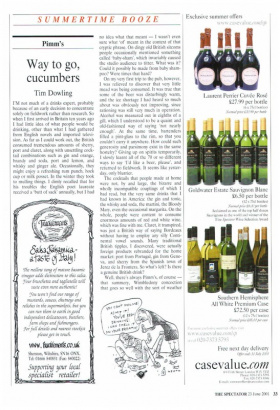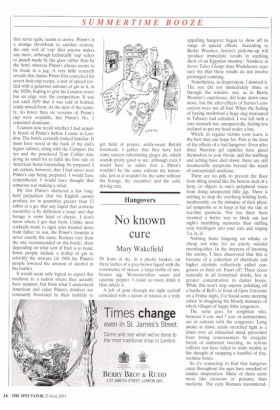Pimm's
Way to go, cucumbers
Tim Dowling
I'M not much of a drinks expert, probably because of an early decision to concentrate solely on fieldwork rather than research. So when I first arrived in Britain ten years ago I had little idea of what people would be drinking, other than what I had gathered from English novels and imported television. As far as I could work out, the British consumed tremendous amounts of sherry, port and claret, along with unsettling cocktail combinations such as gin and orange, brandy and soda, port and lemon, and whisky and ginger ale. Occasionally, they might enjoy a refreshing rum punch, hock cup or milk posset. In the winter they took to mulling things. I dimly recalled that for his troubles the English poet laureate received a 'butt of sack' annually, but I had no idea what that meant — I wasn't even sure what 'of meant in the context of that cryptic phrase. On dingy old British sitcoms people occasionally mentioned something called taby-sham', which invariably caused the studio audience to titter. What was it? Could it possibly be made from baby shampoo? Were times that hard?
On my very first trip to the pub, however, I was relieved to discover that very little mead was being consumed. It was true that some of the beer was disturbingly warm, and the ice shortage I had heard so much about was obviously not improving, since rationing was still very much in operation. Alcohol was measured out in eighths of a gill. which I understood to be a quaint and old-fashioned way of saying 'not nearly enough'. At the same time, bartenders filled a pint-glass to the rim, so that you couldn't carry it anywhere. How could such generosity and parsimony exist in the same hostelry? Giving up on spirits temporarily. I slowly learnt all of the 70 or so different ways to say 'I'd like a beer, please', and returned to fieldwork. It seems like yesterday, only blurrier.
The cocktails that people made at home were not, by and large, the bizarre and wholly incompatible couplings of which I had read, but the very same drinks that I had known in America: the gin and tonic, the whisky and soda, the martini, the Bloody Mary. even the occasional margarita. On the whole, people were content to consume enormous amounts of red and white wine, which was fine with me. Claret, it transpired, was just a British way of saying Bordeaux without having to employ any silly Continental vowel sounds. Many traditional British tipples, I discovered, were actually foreign products rebranded for the home market: port from Portugal, gin from Geneva, and sherry from the Spanish town of Jerez de la Frontera. So what's left? Is there a genuine British drink?
Well, there's always Pimm's, of course — that summery, Wimbledony concoction that goes so well with the sort of weather that never quite seems to arrive. Pimm's is a strange throwback to another century, the only sort of 'cup' that anyone makes any more, although technically 'cup' refers to punch made by the glass rather than by the bowl, whereas Pimm's always seems to be made in a jug. A very little research reveals that James Pimm first conceived his secret fruit-cup recipe, a sort of spiced cordial with a generous amount of gin in it, in the 1820s, hoping to give his London oyster bar an edge over the competition. It was not until 1859 that it was sold in bottled, ready-mixed form. At the turn of the century, no fewer than six versions of Pimm's cup were available, but Pimm's No. 1 remained dominant.
I cannot now recall whether I had actually heard of Pimm's before I came to London. The bottle certainly looked familiar. It must have stood at the back of my dad's liquor cabinet, along with the Campari, the rye and the powdered Tom Collins mix, doing its small bit to fulfil the first rule of American home-bartending: be prepared. I am certain, however, that I had never seen Pimm's cup being prepared. I would have remembered. I would have thought that someone was making a salad.
My first Pimm's shattered a few longheld prejudices: that the English cannot produce ice in quantities greater than 12 cubes at a go; that any liquid that contains cucumber is by definition a soup; and that borage is some kind of cheese. I don't know where I got that from. Unlike most cocktails made to rigid rules handed down from father to son, the Pimm's formula is never exactly the same. Recipes vary from the one recommended on the bottle, often depending on what sort of fruit is to hand. Some people include a dollop of gin to refortify the mixture (in 1988 the Pimm's people lowered the amount of alcohol in the bottle).
It would seem only logical to export this tradition to a nation where they actually have summer, but from what I understand American and expat Pimm's drinkers are constantly frustrated by their inability to get hold of proper, sickly-sweet British lemonade. I gather that they have had some success substituting ginger ale, which sounds pretty good to me, although even I would have to admit that a Pimm's wouldn't be the same without the lemonade, just as it wouldn't be the same without the borage, the cucumber and the cold, driving rain.



































































 Previous page
Previous page